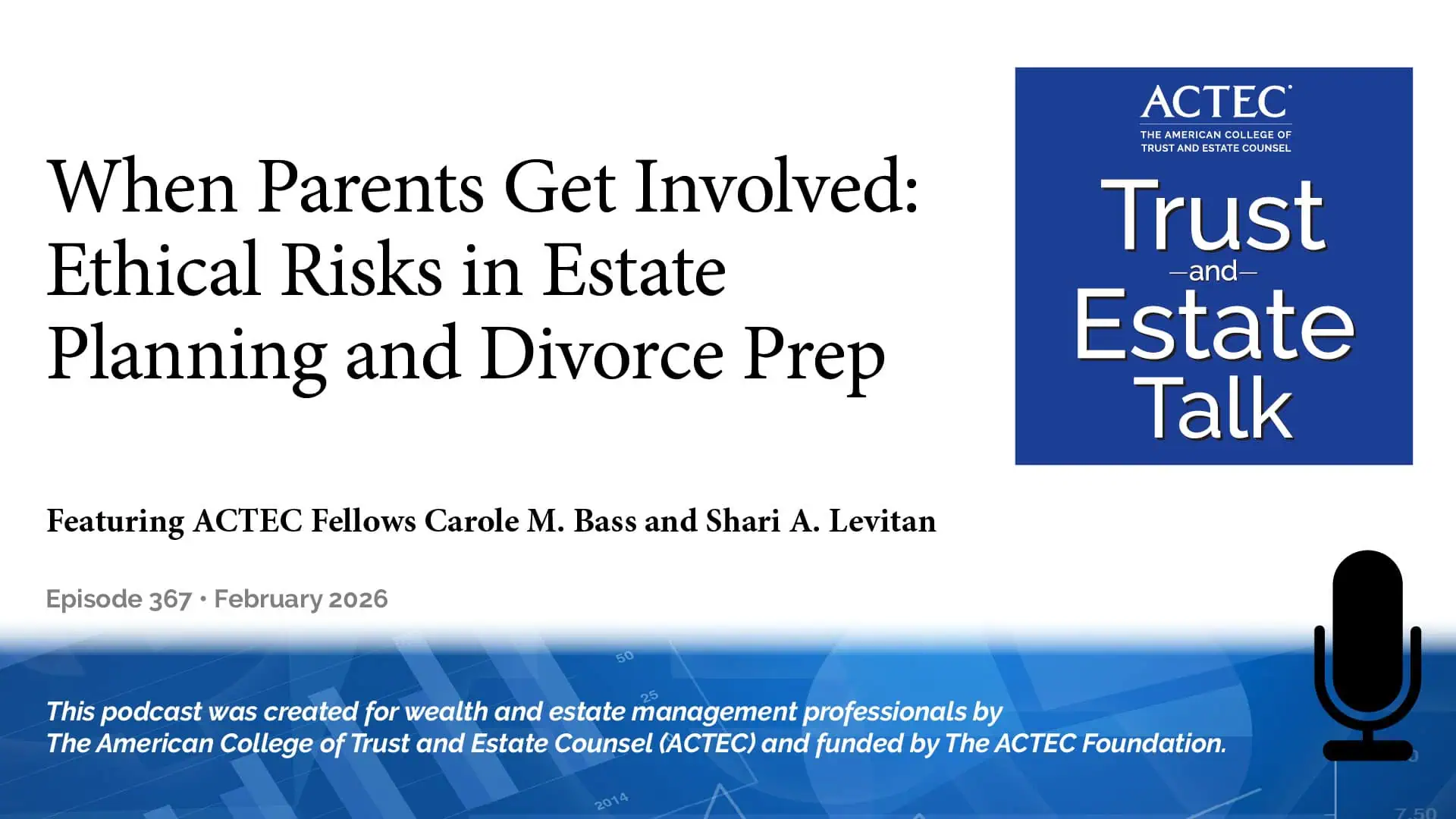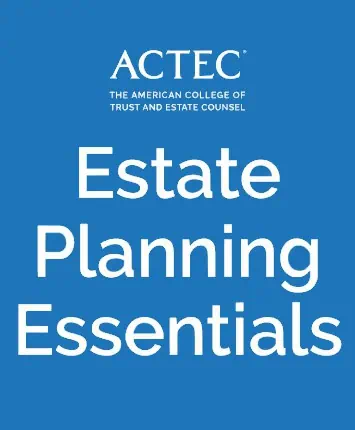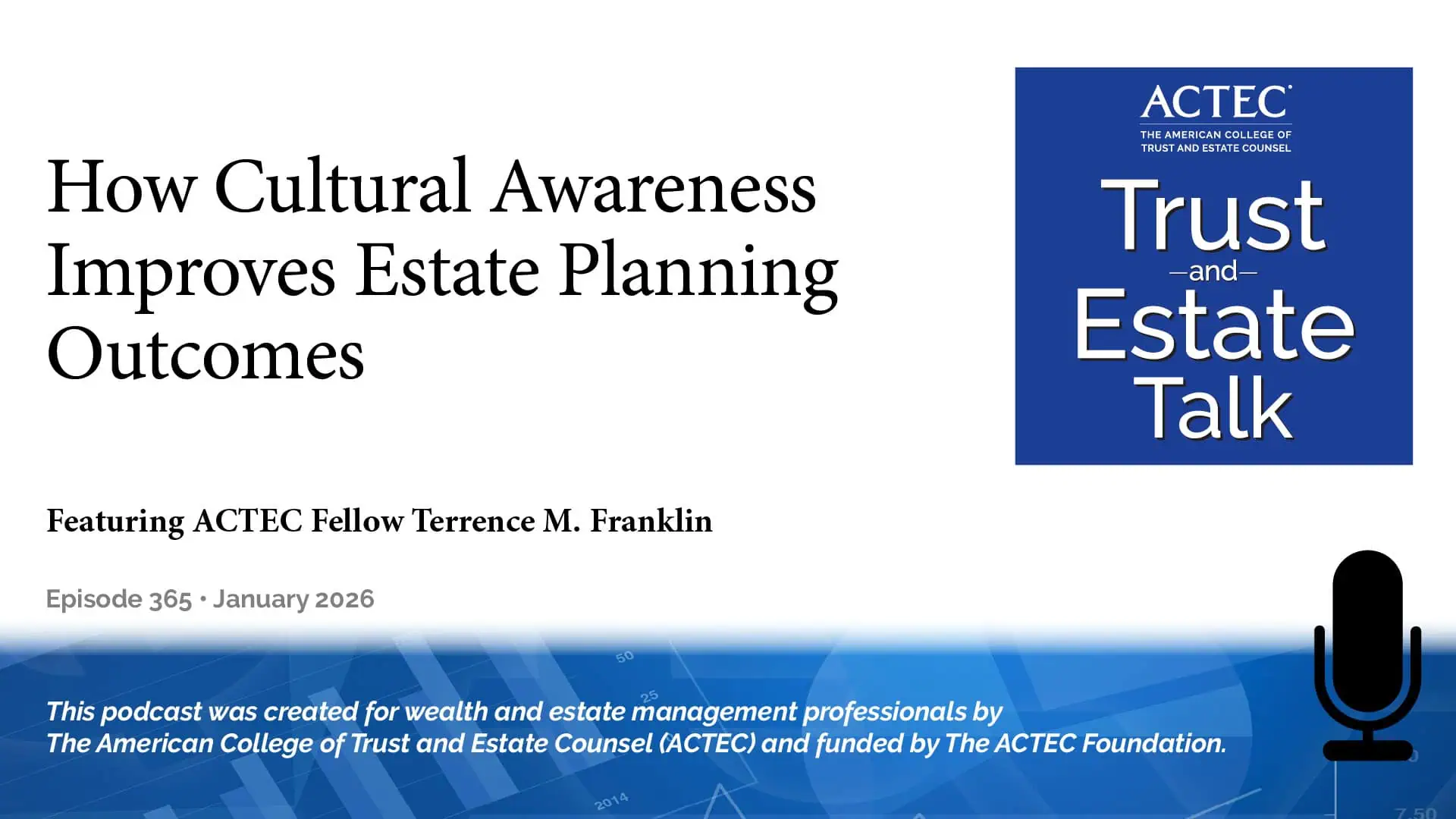Impact of the End of the COVID Public Health Emergency on Medicaid Renewals
“Impact of the End of the COVID Public Health Emergency on Medicaid Renewals,” that’s the subject of today’s ACTEC Trust and Estate Talk.
Transcript/Show Notes
This is Julia Meister, ACTEC Fellow from Cincinnati, Ohio. The Secretary of Health and Human Services issued a COVID Public Health Emergency Declaration that began in January 2020 and ended April 30, 2023. It prevented states that accepted temporary funding under the Families First Coronavirus Response Act from terminating Medicaid eligibility for any individual who had been enrolled in Medicaid on or after March 18, 2020. This meant that states could not discontinue Medicaid benefits due to a change in the recipient’s income or resources for the duration of the declaration. The unwinding of this public health emergency declaration has impacted many Medicaid participants, including the beneficiaries of some Special Needs Trusts, which in turn affects the trustees of those trusts.
ACTEC Fellows Marsha Goodman of Phoenix, Arizona and Tara Ann Pleat of Clifton Park, New York, are with us today to explain the connection between the public health emergency declaration, Medicaid, and Special Needs Trusts. Welcome, Marsha and Tara. Take it away.
Unwinding the COVID Public Health Emergency Declaration
Marsha Goodman: Thank you, Julia. This is Marsha Goodman. Just to give a little bit more detail to what Julia described, during the public health emergency time-period that Julia mentioned, states were not permitted to terminate anyone’s Medicaid benefits, even if their income increased over the maximum allowable or they happened to receive more assets than they were permitted to have for that three-year time period. Then at the end of the public health emergency — April 1st, 2023 — states were given one year, which has now just expired, to review and determine how many of those people should have been disenrolled. And as of this time in that one-year period, 19 million participants in Medicaid programs across the country have been disenrolled from their programs relatively abruptly.
Most of those — or at least this is according to the Medicaid agencies’ self-reporting — were due to procedural reasons. They really should have been terminated, they were just held in place through the emergency, and now that the emergency was finished, it was determined that they were not properly receiving benefits. However, many of them, the reason for the termination was because the agency did not have a correct address or was not able to reach those people, but for whatever reason, they are still eligible for benefits. So, you can imagine this has been quite burdensome on people who are receiving Medicaid and those who are responsible for them.
Addressing Termination of Medicaid Benefits
Marsha Goodman: Tara, why would this be important to practitioners who don’t necessarily work with clients who are eligible for Medicaid or applying for Medicaid in their state?
Tara Anne Pleat: I think to the extent that we’re representing trustees of Supplemental Needs Trusts where trustees are making decisions about how much, what, and when to make distributions on behalf of a beneficiary, they would need to know whether or not their trust beneficiaries are receiving Medicaid-funded benefits. Or, medications that are Medicaid-funded, but Medicaid benefits in general, do they have a means for having their health care paid for? Were they receiving supports and services through a state program that is funded by Medicaid, which is the case for many programs across the country that support individuals with intellectual, developmental, and mental health-related disabilities? And so, where the funding dries up, there may be a need to pay privately for services that the trustees up to this point of use to been seeing paid for through the state Medicaid program dollars.
What we’ve seen around the country is a difference in how the states have either proactively disenrolled folks or notified folks that this disenrollment or redetermination process was occurring. And, unfortunately, when you’re a fiduciary, you don’t get that information. The trustees of these trusts don’t receive notices. The beneficiaries do, or their agents or guardians do. And if they are not aware that they should be giving that information to the trustees that are managing funds for them, there is often a disconnect in the awareness of what’s actually going on.
Communicating and Advising Fiduciaries of Special Needs Trusts
Tara Anne Pleat: Marsha, what have you been advising the fiduciaries that you represent and the families as far as how to make sure that they’re being properly determined through this unwind process?
Marsha Goodman: Well, first, our Medicaid agency did work hard to make sure they did have proper contact information in advance. Starting in January of 2023, so about a quarter before the actual disenrollment period, they had a push — an outreach push — to make sure they had everyone’s contact information. However, of course, if you’re sending a letter to the wrong address, they’re not going to get that letter either. But they did set up a call center and tried to do some outreach through texting to make sure they had everyone’s correct address. And I also encouraged my trustee clients to do the same, to make sure that they had been up-to-date on the contact information for their beneficiary and the Medicaid agency.
Because technically it is an annual renewal process, at least in our state. But if someone started Medicaid coverage during that public health emergency, they never had that experience. They didn’t realize, “Okay, this is something that I have always done that’s on hold right now.” It was something that they had never experienced, and so they did not keep track of any changes in the beneficiary circumstances that would affect their Medicaid eligibility. So, it was an education process throughout.
And unfortunately, the discontinuation notices that people are getting just say, “Your benefits will be discontinued at the end of this month,” without an explanation as to why. All of that is internal to the agency. And if someone has an attorney, an advocate, who calls and says, “What’s going on?” Often it is quite simple to get it reinstated, it is for procedural reasons that can be corrected. But you can imagine how a layperson, a trustee, a family member trustee, or a family member guardian would be so upset by that and not necessarily even call, would just accept it at face value.
Working with Your State’s Department of Health Regarding Special Needs Trusts and Medicaid Benefits
Marsha Goodman: Are you having that experience?
Tara Anne Pleat: We are. I mean, in New York, there was also some proactivity as far as our Department of Health providing some advance notice to the individuals in the state that are receiving Medicaid as a form of health insurance. But it wasn’t perfect, as you can imagine. And our agencies are very much understaffed. And so there’s been some difficulty in proactive communication coming back to us when a communication is made to the agency to check in on a particular individual.
Now, with respect to our corporate fiduciaries and our family member fiduciaries that we represent and advise, there is around the country quite a significant amount of case law regarding the responsibilities of a fiduciary of a trust, like a Supplemental Needs Trust. And one of those is to, at a bare minimum, have an understanding of the benefits that your beneficiary is receiving. That requires some involvement of the beneficiary or their agent or guardian, as I mentioned before. But in those cases, we have been advising our trustees that we have to go through a benefits audit.
And we need to be communicating with the family, whether it’s directly or through a case manager, to access the information we need so we can help advise them. And if somebody was inappropriately disenrolled, the point you made, if somebody became eligible during the pandemic, they’ve never recertified. So remember that this program is for individuals who are often cognitively or physically compromised. And so they may not recognize, their family may not recognize, and we’ve just got to do our best to be proactive in continuing to advise people to be on the lookout and advise the trustees that they need to continue to ask questions if they don’t have confirmation about what benefits are being received.
Resource for Practitioners Advising Clients on Medicaid Enrollment and Unwinding
Marsha Goodman: And an excellent place for people to receive information about this process is a tracker that’s published by the Kaiser Family Foundation, and that link will be provided. They have updated that information every month throughout this process, and I believe they will continue to do so, even though it is technically concluded.
Julia Meister: Thank you, Marcia and Tara, for discussing these nuances with us. I’m sure that all of our listeners appreciate your insights.
You may also be interested in:
- Medicaid Enrollment and Unwinding Tracker by the Kaiser Family Foundation
- Trusts for Disabled and Chronically Ill Beneficiaries under the SECURE Act | Special Needs Trust (Sep 2020)
Resources for Clients
Latest ACTEC Trust and Estate Talk Podcasts

Estate Planning Considerations in Community Property States Relating to Retirement Accounts
Explore how community property laws shape IRAs, 401(k)s, beneficiary designations, and spousal rights in retirement account estate planning.

When Parents Get Involved: Ethical Risks in Estate Planning and Divorce Prep
When parents join prenup or divorce planning, ethical risks follow. ACTEC Fellows explore privilege, conflicts, and protecting the attorney-client relationship.

Useful But Overlooked Trusts: A Planner’s Guide to When and How to Use Them
Explore overlooked trusts—including HEETs, alimony, voting, and blind trusts—and when estate planners should use them to address complex client needs.



